7100NRS: Reflective Report on Anaphylaxis and Advanced Assessment
VerifiedAdded on 2023/06/10
|8
|2891
|457
Report
AI Summary
This assignment is a reflective report employing Gibbs' Reflective Cycle to analyze the impact of learning about advanced health assessment, specifically in the context of anaphylaxis management in an acute clinical setting. The reflection covers a real-life experience of managing a patient with anaphylaxis, detailing the feelings, evaluation, and analysis of the situation. It emphasizes the importance of applying theoretical knowledge in practice and identifies areas for improvement, such as enhancing problem-solving and decision-making skills. The report concludes with an action plan for future similar situations, aiming to provide more effective and timely care, improve skills, and seek assistance from other nursing staff when needed. The reflection highlights the critical role of continuous learning and skill development in nursing practice to ensure better patient outcomes and professional growth.
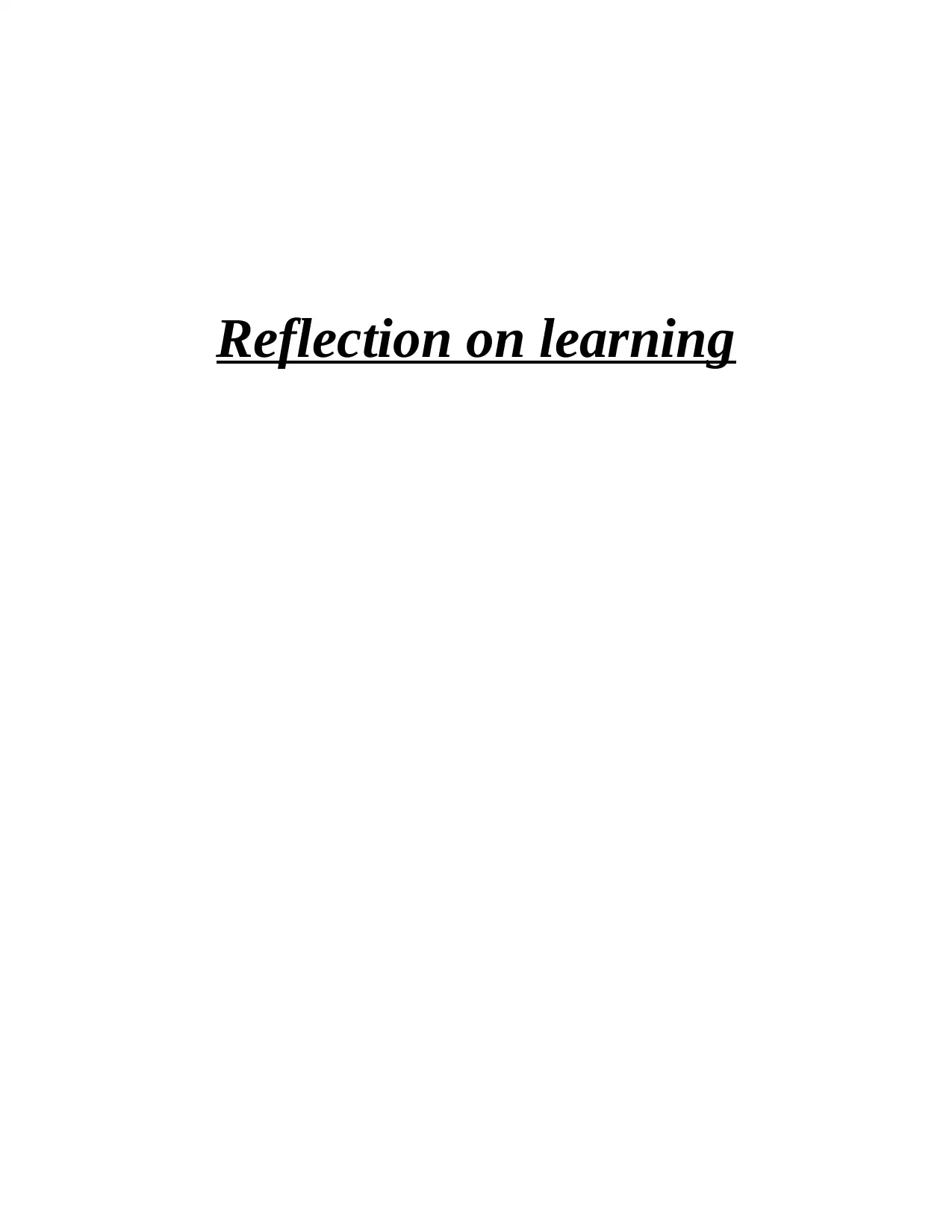
Reflection on learning
Paraphrase This Document
Need a fresh take? Get an instant paraphrase of this document with our AI Paraphraser
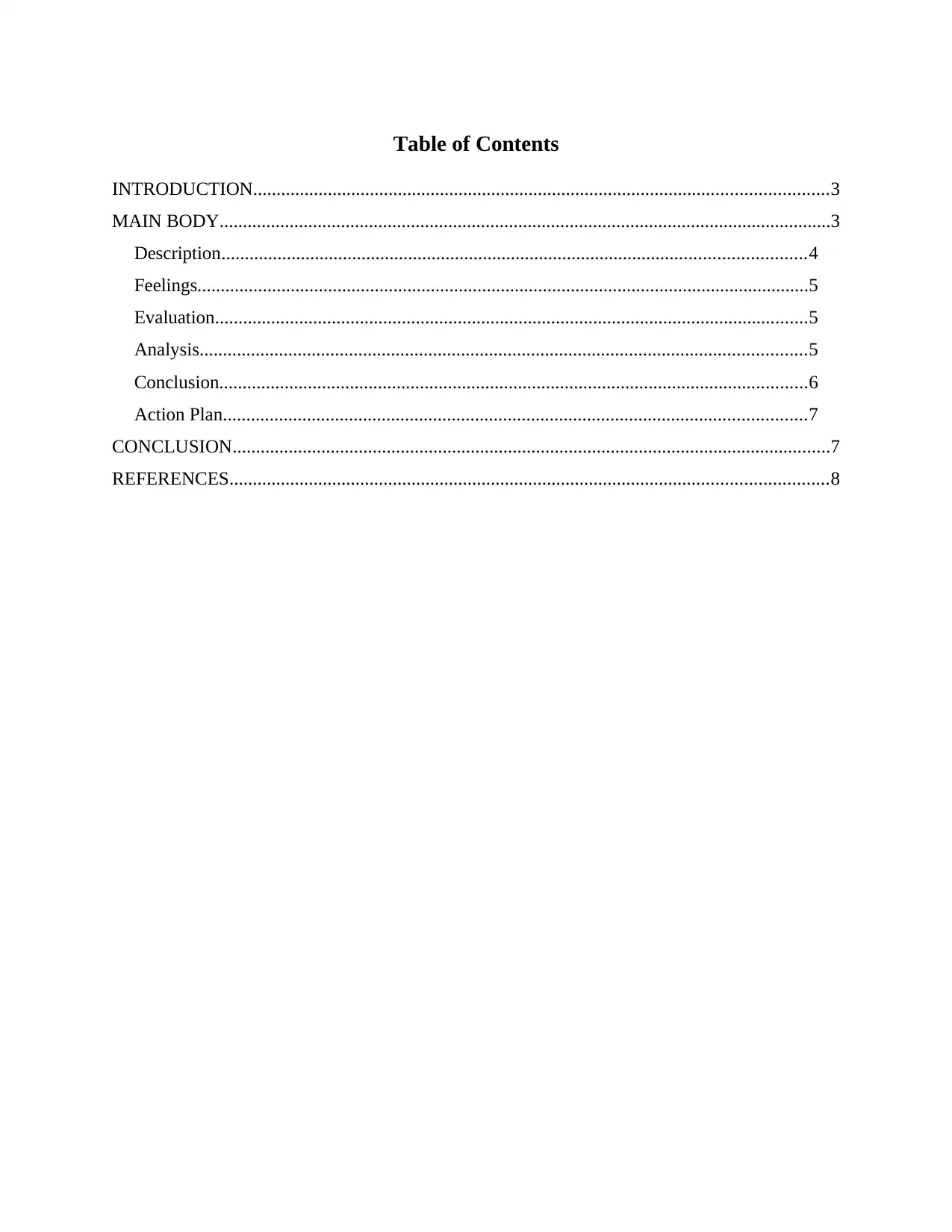
Table of Contents
INTRODUCTION...........................................................................................................................3
MAIN BODY...................................................................................................................................3
Description.............................................................................................................................4
Feelings...................................................................................................................................5
Evaluation...............................................................................................................................5
Analysis..................................................................................................................................5
Conclusion..............................................................................................................................6
Action Plan.............................................................................................................................7
CONCLUSION................................................................................................................................7
REFERENCES................................................................................................................................8
INTRODUCTION...........................................................................................................................3
MAIN BODY...................................................................................................................................3
Description.............................................................................................................................4
Feelings...................................................................................................................................5
Evaluation...............................................................................................................................5
Analysis..................................................................................................................................5
Conclusion..............................................................................................................................6
Action Plan.............................................................................................................................7
CONCLUSION................................................................................................................................7
REFERENCES................................................................................................................................8
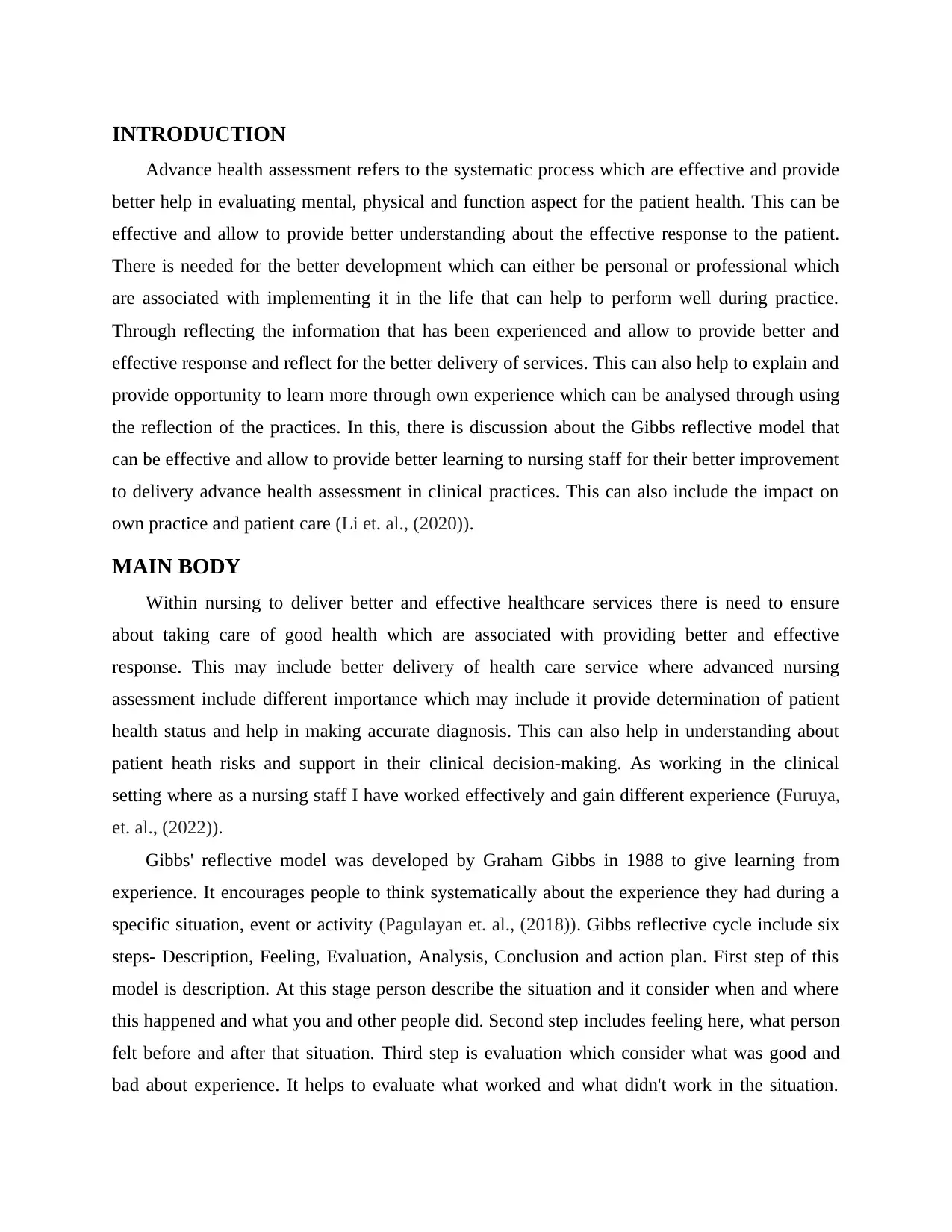
INTRODUCTION
Advance health assessment refers to the systematic process which are effective and provide
better help in evaluating mental, physical and function aspect for the patient health. This can be
effective and allow to provide better understanding about the effective response to the patient.
There is needed for the better development which can either be personal or professional which
are associated with implementing it in the life that can help to perform well during practice.
Through reflecting the information that has been experienced and allow to provide better and
effective response and reflect for the better delivery of services. This can also help to explain and
provide opportunity to learn more through own experience which can be analysed through using
the reflection of the practices. In this, there is discussion about the Gibbs reflective model that
can be effective and allow to provide better learning to nursing staff for their better improvement
to delivery advance health assessment in clinical practices. This can also include the impact on
own practice and patient care (Li et. al., (2020)).
MAIN BODY
Within nursing to deliver better and effective healthcare services there is need to ensure
about taking care of good health which are associated with providing better and effective
response. This may include better delivery of health care service where advanced nursing
assessment include different importance which may include it provide determination of patient
health status and help in making accurate diagnosis. This can also help in understanding about
patient heath risks and support in their clinical decision-making. As working in the clinical
setting where as a nursing staff I have worked effectively and gain different experience (Furuya,
et. al., (2022)).
Gibbs' reflective model was developed by Graham Gibbs in 1988 to give learning from
experience. It encourages people to think systematically about the experience they had during a
specific situation, event or activity (Pagulayan et. al., (2018)). Gibbs reflective cycle include six
steps- Description, Feeling, Evaluation, Analysis, Conclusion and action plan. First step of this
model is description. At this stage person describe the situation and it consider when and where
this happened and what you and other people did. Second step includes feeling here, what person
felt before and after that situation. Third step is evaluation which consider what was good and
bad about experience. It helps to evaluate what worked and what didn't work in the situation.
Advance health assessment refers to the systematic process which are effective and provide
better help in evaluating mental, physical and function aspect for the patient health. This can be
effective and allow to provide better understanding about the effective response to the patient.
There is needed for the better development which can either be personal or professional which
are associated with implementing it in the life that can help to perform well during practice.
Through reflecting the information that has been experienced and allow to provide better and
effective response and reflect for the better delivery of services. This can also help to explain and
provide opportunity to learn more through own experience which can be analysed through using
the reflection of the practices. In this, there is discussion about the Gibbs reflective model that
can be effective and allow to provide better learning to nursing staff for their better improvement
to delivery advance health assessment in clinical practices. This can also include the impact on
own practice and patient care (Li et. al., (2020)).
MAIN BODY
Within nursing to deliver better and effective healthcare services there is need to ensure
about taking care of good health which are associated with providing better and effective
response. This may include better delivery of health care service where advanced nursing
assessment include different importance which may include it provide determination of patient
health status and help in making accurate diagnosis. This can also help in understanding about
patient heath risks and support in their clinical decision-making. As working in the clinical
setting where as a nursing staff I have worked effectively and gain different experience (Furuya,
et. al., (2022)).
Gibbs' reflective model was developed by Graham Gibbs in 1988 to give learning from
experience. It encourages people to think systematically about the experience they had during a
specific situation, event or activity (Pagulayan et. al., (2018)). Gibbs reflective cycle include six
steps- Description, Feeling, Evaluation, Analysis, Conclusion and action plan. First step of this
model is description. At this stage person describe the situation and it consider when and where
this happened and what you and other people did. Second step includes feeling here, what person
felt before and after that situation. Third step is evaluation which consider what was good and
bad about experience. It helps to evaluate what worked and what didn't work in the situation.
⊘ This is a preview!⊘
Do you want full access?
Subscribe today to unlock all pages.

Trusted by 1+ million students worldwide
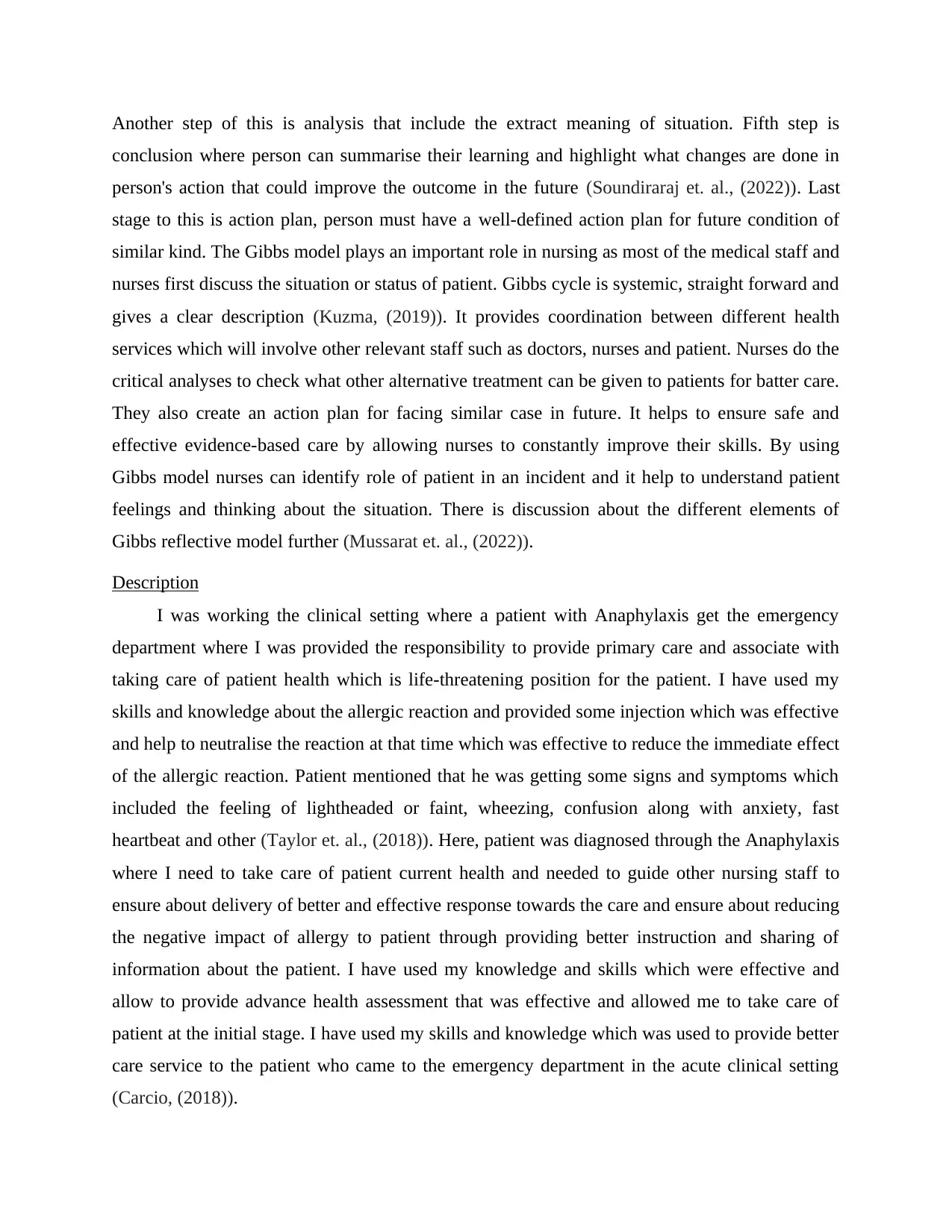
Another step of this is analysis that include the extract meaning of situation. Fifth step is
conclusion where person can summarise their learning and highlight what changes are done in
person's action that could improve the outcome in the future (Soundiraraj et. al., (2022)). Last
stage to this is action plan, person must have a well-defined action plan for future condition of
similar kind. The Gibbs model plays an important role in nursing as most of the medical staff and
nurses first discuss the situation or status of patient. Gibbs cycle is systemic, straight forward and
gives a clear description (Kuzma, (2019)). It provides coordination between different health
services which will involve other relevant staff such as doctors, nurses and patient. Nurses do the
critical analyses to check what other alternative treatment can be given to patients for batter care.
They also create an action plan for facing similar case in future. It helps to ensure safe and
effective evidence-based care by allowing nurses to constantly improve their skills. By using
Gibbs model nurses can identify role of patient in an incident and it help to understand patient
feelings and thinking about the situation. There is discussion about the different elements of
Gibbs reflective model further (Mussarat et. al., (2022)).
Description
I was working the clinical setting where a patient with Anaphylaxis get the emergency
department where I was provided the responsibility to provide primary care and associate with
taking care of patient health which is life-threatening position for the patient. I have used my
skills and knowledge about the allergic reaction and provided some injection which was effective
and help to neutralise the reaction at that time which was effective to reduce the immediate effect
of the allergic reaction. Patient mentioned that he was getting some signs and symptoms which
included the feeling of lightheaded or faint, wheezing, confusion along with anxiety, fast
heartbeat and other (Taylor et. al., (2018)). Here, patient was diagnosed through the Anaphylaxis
where I need to take care of patient current health and needed to guide other nursing staff to
ensure about delivery of better and effective response towards the care and ensure about reducing
the negative impact of allergy to patient through providing better instruction and sharing of
information about the patient. I have used my knowledge and skills which were effective and
allow to provide advance health assessment that was effective and allowed me to take care of
patient at the initial stage. I have used my skills and knowledge which was used to provide better
care service to the patient who came to the emergency department in the acute clinical setting
(Carcio, (2018)).
conclusion where person can summarise their learning and highlight what changes are done in
person's action that could improve the outcome in the future (Soundiraraj et. al., (2022)). Last
stage to this is action plan, person must have a well-defined action plan for future condition of
similar kind. The Gibbs model plays an important role in nursing as most of the medical staff and
nurses first discuss the situation or status of patient. Gibbs cycle is systemic, straight forward and
gives a clear description (Kuzma, (2019)). It provides coordination between different health
services which will involve other relevant staff such as doctors, nurses and patient. Nurses do the
critical analyses to check what other alternative treatment can be given to patients for batter care.
They also create an action plan for facing similar case in future. It helps to ensure safe and
effective evidence-based care by allowing nurses to constantly improve their skills. By using
Gibbs model nurses can identify role of patient in an incident and it help to understand patient
feelings and thinking about the situation. There is discussion about the different elements of
Gibbs reflective model further (Mussarat et. al., (2022)).
Description
I was working the clinical setting where a patient with Anaphylaxis get the emergency
department where I was provided the responsibility to provide primary care and associate with
taking care of patient health which is life-threatening position for the patient. I have used my
skills and knowledge about the allergic reaction and provided some injection which was effective
and help to neutralise the reaction at that time which was effective to reduce the immediate effect
of the allergic reaction. Patient mentioned that he was getting some signs and symptoms which
included the feeling of lightheaded or faint, wheezing, confusion along with anxiety, fast
heartbeat and other (Taylor et. al., (2018)). Here, patient was diagnosed through the Anaphylaxis
where I need to take care of patient current health and needed to guide other nursing staff to
ensure about delivery of better and effective response towards the care and ensure about reducing
the negative impact of allergy to patient through providing better instruction and sharing of
information about the patient. I have used my knowledge and skills which were effective and
allow to provide advance health assessment that was effective and allowed me to take care of
patient at the initial stage. I have used my skills and knowledge which was used to provide better
care service to the patient who came to the emergency department in the acute clinical setting
(Carcio, (2018)).
Paraphrase This Document
Need a fresh take? Get an instant paraphrase of this document with our AI Paraphraser
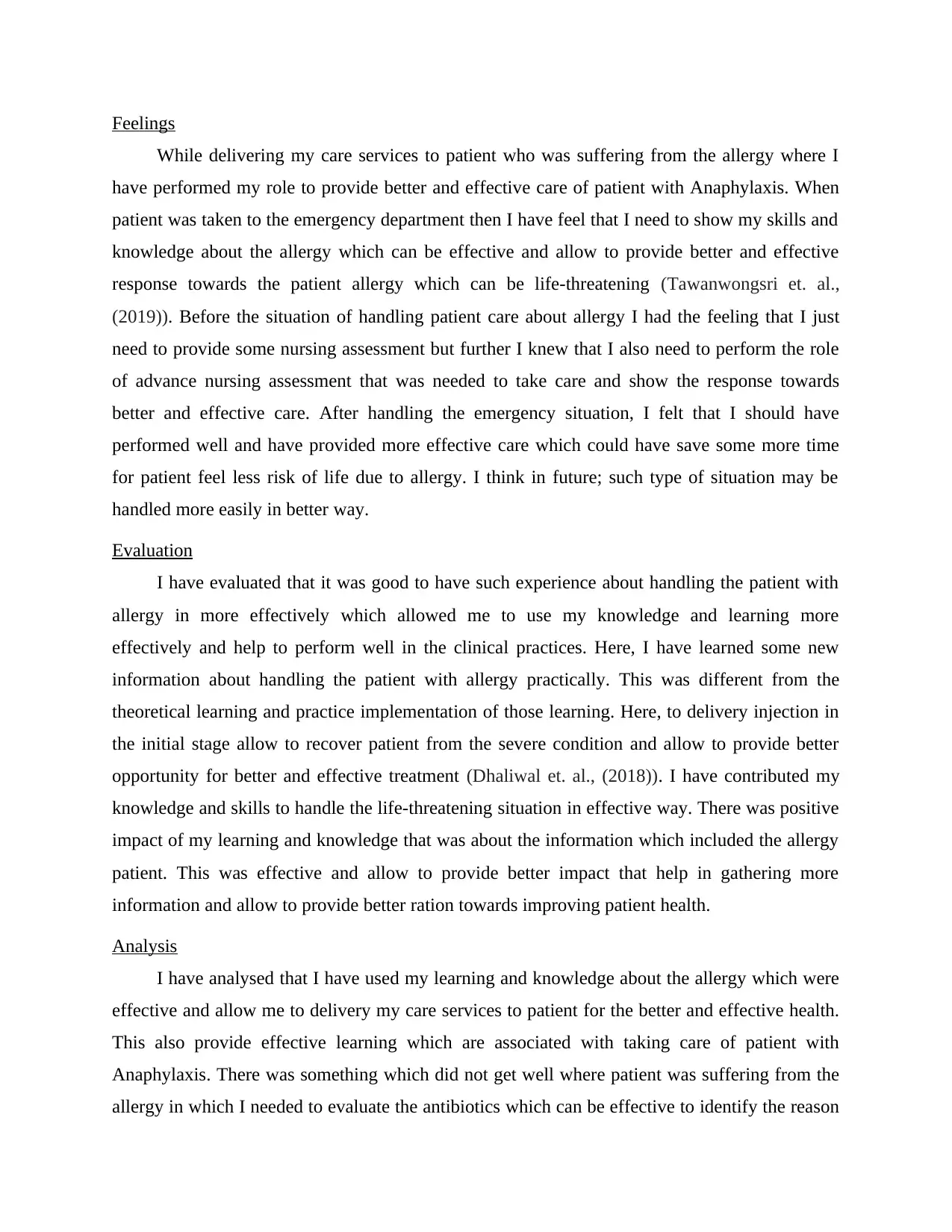
Feelings
While delivering my care services to patient who was suffering from the allergy where I
have performed my role to provide better and effective care of patient with Anaphylaxis. When
patient was taken to the emergency department then I have feel that I need to show my skills and
knowledge about the allergy which can be effective and allow to provide better and effective
response towards the patient allergy which can be life-threatening (Tawanwongsri et. al.,
(2019)). Before the situation of handling patient care about allergy I had the feeling that I just
need to provide some nursing assessment but further I knew that I also need to perform the role
of advance nursing assessment that was needed to take care and show the response towards
better and effective care. After handling the emergency situation, I felt that I should have
performed well and have provided more effective care which could have save some more time
for patient feel less risk of life due to allergy. I think in future; such type of situation may be
handled more easily in better way.
Evaluation
I have evaluated that it was good to have such experience about handling the patient with
allergy in more effectively which allowed me to use my knowledge and learning more
effectively and help to perform well in the clinical practices. Here, I have learned some new
information about handling the patient with allergy practically. This was different from the
theoretical learning and practice implementation of those learning. Here, to delivery injection in
the initial stage allow to recover patient from the severe condition and allow to provide better
opportunity for better and effective treatment (Dhaliwal et. al., (2018)). I have contributed my
knowledge and skills to handle the life-threatening situation in effective way. There was positive
impact of my learning and knowledge that was about the information which included the allergy
patient. This was effective and allow to provide better impact that help in gathering more
information and allow to provide better ration towards improving patient health.
Analysis
I have analysed that I have used my learning and knowledge about the allergy which were
effective and allow me to delivery my care services to patient for the better and effective health.
This also provide effective learning which are associated with taking care of patient with
Anaphylaxis. There was something which did not get well where patient was suffering from the
allergy in which I needed to evaluate the antibiotics which can be effective to identify the reason
While delivering my care services to patient who was suffering from the allergy where I
have performed my role to provide better and effective care of patient with Anaphylaxis. When
patient was taken to the emergency department then I have feel that I need to show my skills and
knowledge about the allergy which can be effective and allow to provide better and effective
response towards the patient allergy which can be life-threatening (Tawanwongsri et. al.,
(2019)). Before the situation of handling patient care about allergy I had the feeling that I just
need to provide some nursing assessment but further I knew that I also need to perform the role
of advance nursing assessment that was needed to take care and show the response towards
better and effective care. After handling the emergency situation, I felt that I should have
performed well and have provided more effective care which could have save some more time
for patient feel less risk of life due to allergy. I think in future; such type of situation may be
handled more easily in better way.
Evaluation
I have evaluated that it was good to have such experience about handling the patient with
allergy in more effectively which allowed me to use my knowledge and learning more
effectively and help to perform well in the clinical practices. Here, I have learned some new
information about handling the patient with allergy practically. This was different from the
theoretical learning and practice implementation of those learning. Here, to delivery injection in
the initial stage allow to recover patient from the severe condition and allow to provide better
opportunity for better and effective treatment (Dhaliwal et. al., (2018)). I have contributed my
knowledge and skills to handle the life-threatening situation in effective way. There was positive
impact of my learning and knowledge that was about the information which included the allergy
patient. This was effective and allow to provide better impact that help in gathering more
information and allow to provide better ration towards improving patient health.
Analysis
I have analysed that I have used my learning and knowledge about the allergy which were
effective and allow me to delivery my care services to patient for the better and effective health.
This also provide effective learning which are associated with taking care of patient with
Anaphylaxis. There was something which did not get well where patient was suffering from the
allergy in which I needed to evaluate the antibiotics which can be effective to identify the reason
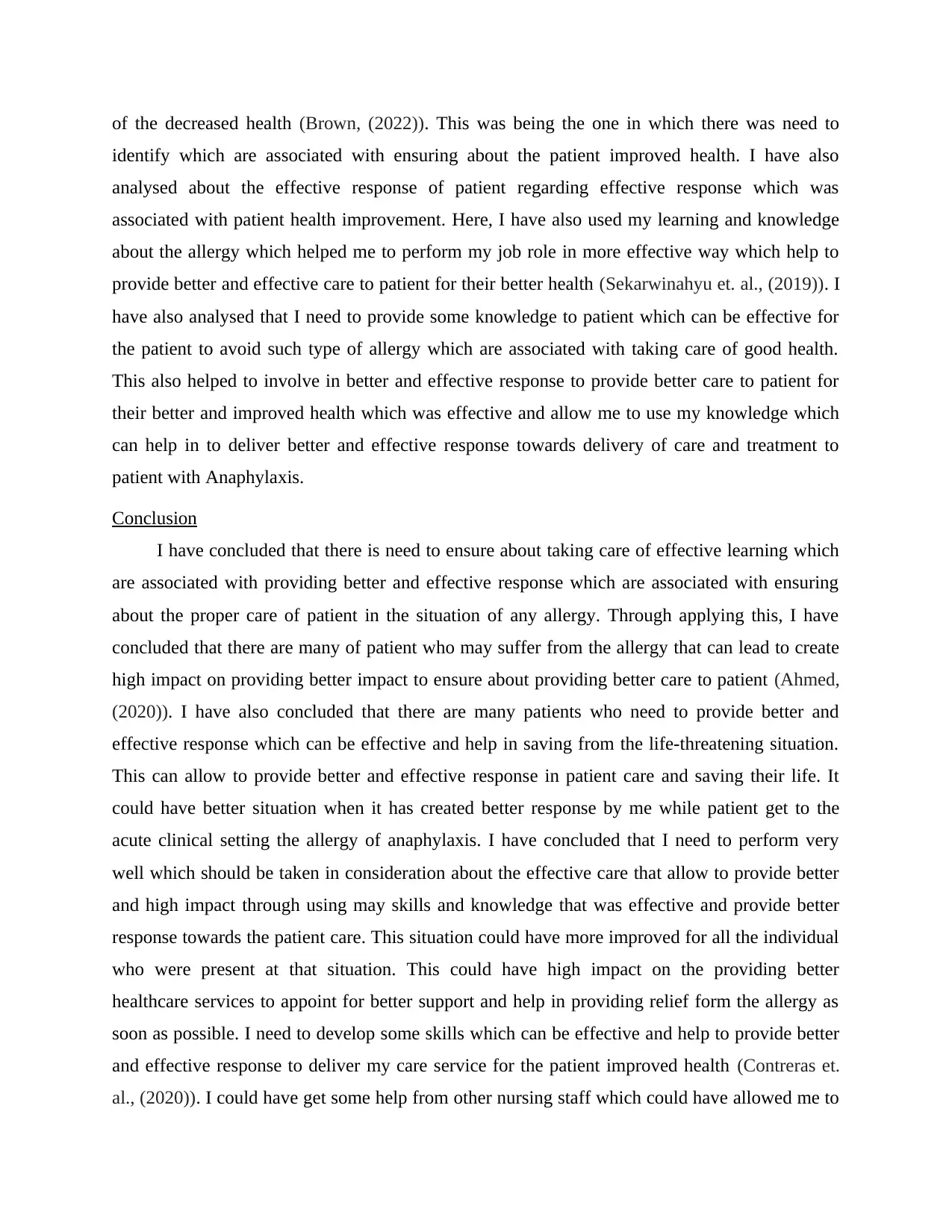
of the decreased health (Brown, (2022)). This was being the one in which there was need to
identify which are associated with ensuring about the patient improved health. I have also
analysed about the effective response of patient regarding effective response which was
associated with patient health improvement. Here, I have also used my learning and knowledge
about the allergy which helped me to perform my job role in more effective way which help to
provide better and effective care to patient for their better health (Sekarwinahyu et. al., (2019)). I
have also analysed that I need to provide some knowledge to patient which can be effective for
the patient to avoid such type of allergy which are associated with taking care of good health.
This also helped to involve in better and effective response to provide better care to patient for
their better and improved health which was effective and allow me to use my knowledge which
can help in to deliver better and effective response towards delivery of care and treatment to
patient with Anaphylaxis.
Conclusion
I have concluded that there is need to ensure about taking care of effective learning which
are associated with providing better and effective response which are associated with ensuring
about the proper care of patient in the situation of any allergy. Through applying this, I have
concluded that there are many of patient who may suffer from the allergy that can lead to create
high impact on providing better impact to ensure about providing better care to patient (Ahmed,
(2020)). I have also concluded that there are many patients who need to provide better and
effective response which can be effective and help in saving from the life-threatening situation.
This can allow to provide better and effective response in patient care and saving their life. It
could have better situation when it has created better response by me while patient get to the
acute clinical setting the allergy of anaphylaxis. I have concluded that I need to perform very
well which should be taken in consideration about the effective care that allow to provide better
and high impact through using may skills and knowledge that was effective and provide better
response towards the patient care. This situation could have more improved for all the individual
who were present at that situation. This could have high impact on the providing better
healthcare services to appoint for better support and help in providing relief form the allergy as
soon as possible. I need to develop some skills which can be effective and help to provide better
and effective response to deliver my care service for the patient improved health (Contreras et.
al., (2020)). I could have get some help from other nursing staff which could have allowed me to
identify which are associated with ensuring about the patient improved health. I have also
analysed about the effective response of patient regarding effective response which was
associated with patient health improvement. Here, I have also used my learning and knowledge
about the allergy which helped me to perform my job role in more effective way which help to
provide better and effective care to patient for their better health (Sekarwinahyu et. al., (2019)). I
have also analysed that I need to provide some knowledge to patient which can be effective for
the patient to avoid such type of allergy which are associated with taking care of good health.
This also helped to involve in better and effective response to provide better care to patient for
their better and improved health which was effective and allow me to use my knowledge which
can help in to deliver better and effective response towards delivery of care and treatment to
patient with Anaphylaxis.
Conclusion
I have concluded that there is need to ensure about taking care of effective learning which
are associated with providing better and effective response which are associated with ensuring
about the proper care of patient in the situation of any allergy. Through applying this, I have
concluded that there are many of patient who may suffer from the allergy that can lead to create
high impact on providing better impact to ensure about providing better care to patient (Ahmed,
(2020)). I have also concluded that there are many patients who need to provide better and
effective response which can be effective and help in saving from the life-threatening situation.
This can allow to provide better and effective response in patient care and saving their life. It
could have better situation when it has created better response by me while patient get to the
acute clinical setting the allergy of anaphylaxis. I have concluded that I need to perform very
well which should be taken in consideration about the effective care that allow to provide better
and high impact through using may skills and knowledge that was effective and provide better
response towards the patient care. This situation could have more improved for all the individual
who were present at that situation. This could have high impact on the providing better
healthcare services to appoint for better support and help in providing relief form the allergy as
soon as possible. I need to develop some skills which can be effective and help to provide better
and effective response to deliver my care service for the patient improved health (Contreras et.
al., (2020)). I could have get some help from other nursing staff which could have allowed me to
⊘ This is a preview!⊘
Do you want full access?
Subscribe today to unlock all pages.

Trusted by 1+ million students worldwide
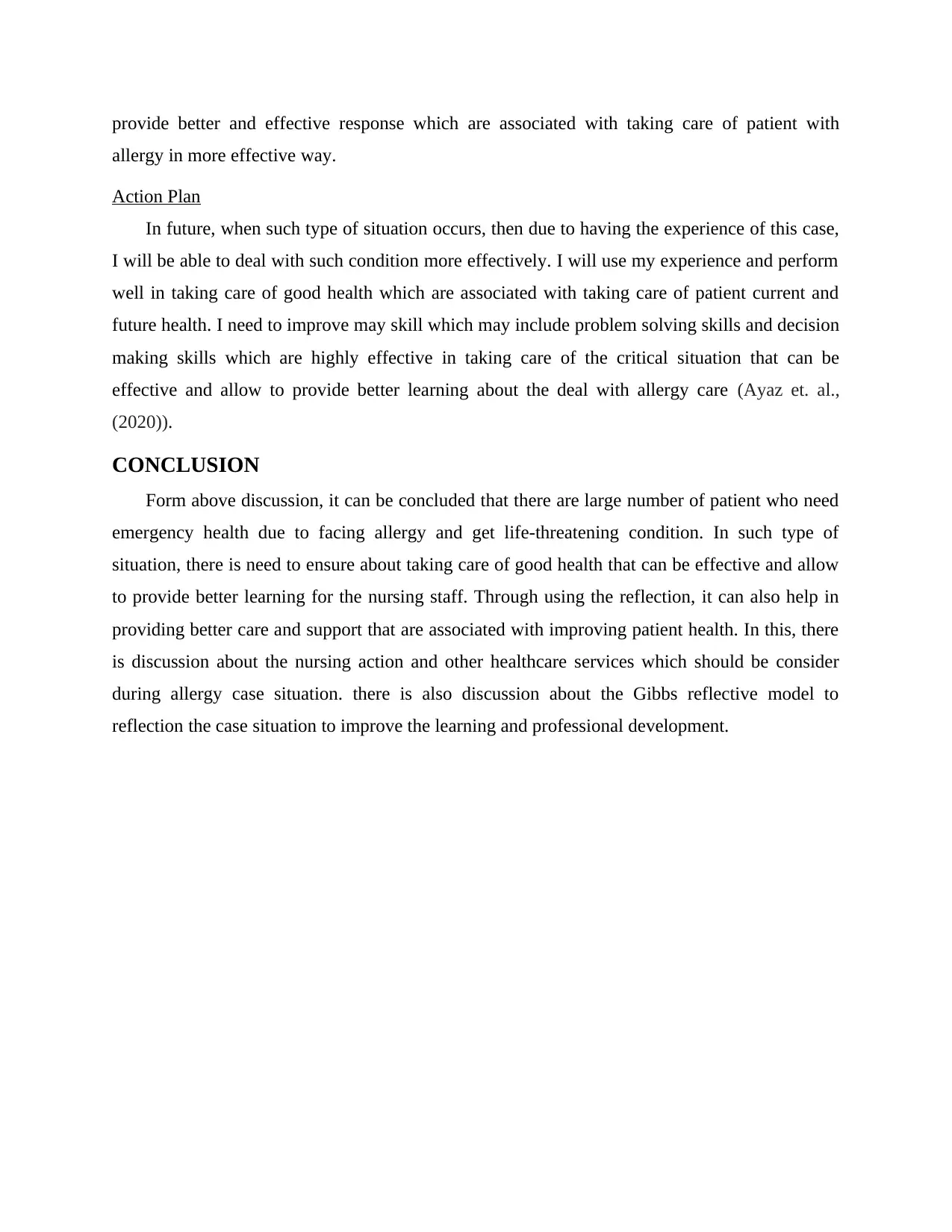
provide better and effective response which are associated with taking care of patient with
allergy in more effective way.
Action Plan
In future, when such type of situation occurs, then due to having the experience of this case,
I will be able to deal with such condition more effectively. I will use my experience and perform
well in taking care of good health which are associated with taking care of patient current and
future health. I need to improve may skill which may include problem solving skills and decision
making skills which are highly effective in taking care of the critical situation that can be
effective and allow to provide better learning about the deal with allergy care (Ayaz et. al.,
(2020)).
CONCLUSION
Form above discussion, it can be concluded that there are large number of patient who need
emergency health due to facing allergy and get life-threatening condition. In such type of
situation, there is need to ensure about taking care of good health that can be effective and allow
to provide better learning for the nursing staff. Through using the reflection, it can also help in
providing better care and support that are associated with improving patient health. In this, there
is discussion about the nursing action and other healthcare services which should be consider
during allergy case situation. there is also discussion about the Gibbs reflective model to
reflection the case situation to improve the learning and professional development.
allergy in more effective way.
Action Plan
In future, when such type of situation occurs, then due to having the experience of this case,
I will be able to deal with such condition more effectively. I will use my experience and perform
well in taking care of good health which are associated with taking care of patient current and
future health. I need to improve may skill which may include problem solving skills and decision
making skills which are highly effective in taking care of the critical situation that can be
effective and allow to provide better learning about the deal with allergy care (Ayaz et. al.,
(2020)).
CONCLUSION
Form above discussion, it can be concluded that there are large number of patient who need
emergency health due to facing allergy and get life-threatening condition. In such type of
situation, there is need to ensure about taking care of good health that can be effective and allow
to provide better learning for the nursing staff. Through using the reflection, it can also help in
providing better care and support that are associated with improving patient health. In this, there
is discussion about the nursing action and other healthcare services which should be consider
during allergy case situation. there is also discussion about the Gibbs reflective model to
reflection the case situation to improve the learning and professional development.
Paraphrase This Document
Need a fresh take? Get an instant paraphrase of this document with our AI Paraphraser
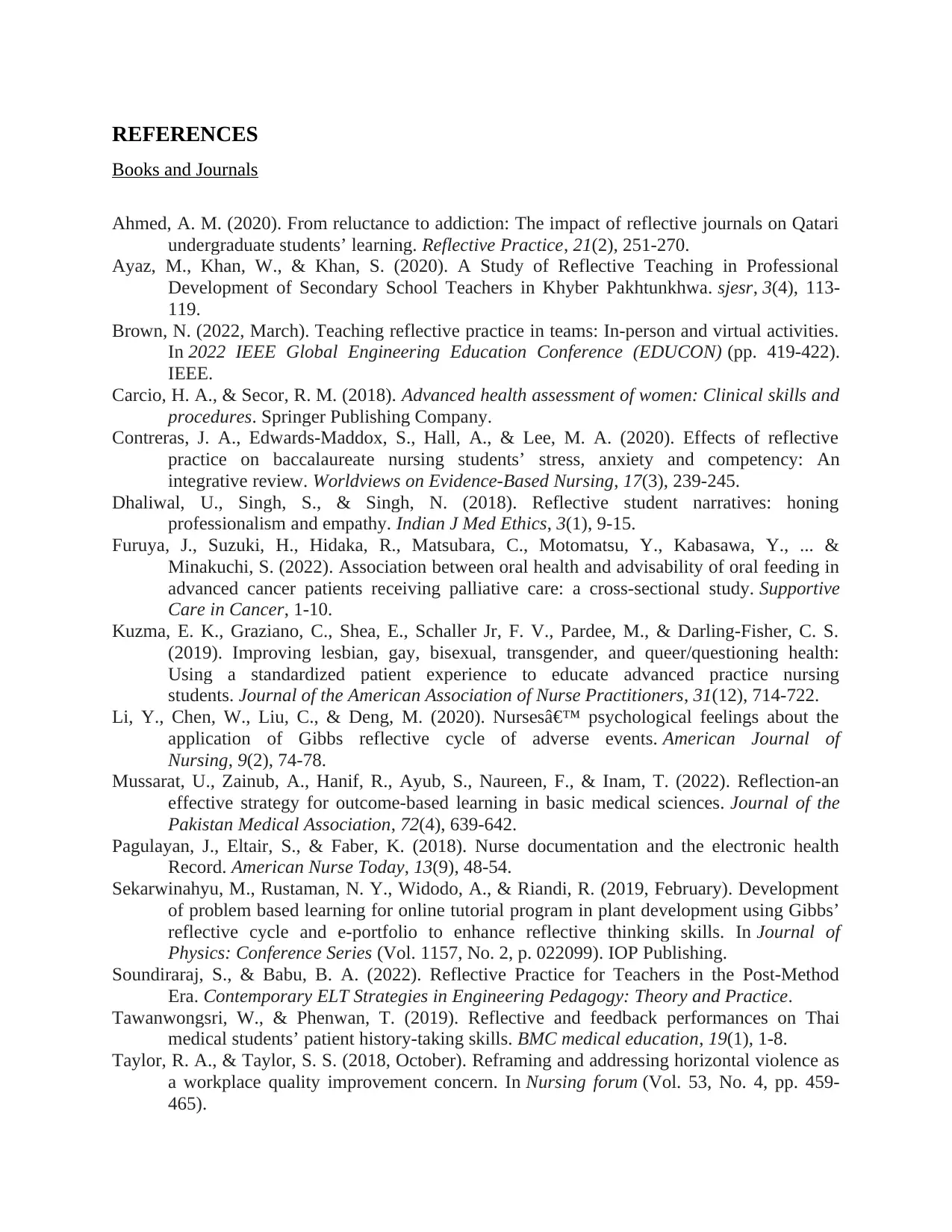
REFERENCES
Books and Journals
Ahmed, A. M. (2020). From reluctance to addiction: The impact of reflective journals on Qatari
undergraduate students’ learning. Reflective Practice, 21(2), 251-270.
Ayaz, M., Khan, W., & Khan, S. (2020). A Study of Reflective Teaching in Professional
Development of Secondary School Teachers in Khyber Pakhtunkhwa. sjesr, 3(4), 113-
119.
Brown, N. (2022, March). Teaching reflective practice in teams: In-person and virtual activities.
In 2022 IEEE Global Engineering Education Conference (EDUCON) (pp. 419-422).
IEEE.
Carcio, H. A., & Secor, R. M. (2018). Advanced health assessment of women: Clinical skills and
procedures. Springer Publishing Company.
Contreras, J. A., Edwards‐Maddox, S., Hall, A., & Lee, M. A. (2020). Effects of reflective
practice on baccalaureate nursing students’ stress, anxiety and competency: An
integrative review. Worldviews on Evidence‐Based Nursing, 17(3), 239-245.
Dhaliwal, U., Singh, S., & Singh, N. (2018). Reflective student narratives: honing
professionalism and empathy. Indian J Med Ethics, 3(1), 9-15.
Furuya, J., Suzuki, H., Hidaka, R., Matsubara, C., Motomatsu, Y., Kabasawa, Y., ... &
Minakuchi, S. (2022). Association between oral health and advisability of oral feeding in
advanced cancer patients receiving palliative care: a cross-sectional study. Supportive
Care in Cancer, 1-10.
Kuzma, E. K., Graziano, C., Shea, E., Schaller Jr, F. V., Pardee, M., & Darling-Fisher, C. S.
(2019). Improving lesbian, gay, bisexual, transgender, and queer/questioning health:
Using a standardized patient experience to educate advanced practice nursing
students. Journal of the American Association of Nurse Practitioners, 31(12), 714-722.
Li, Y., Chen, W., Liu, C., & Deng, M. (2020). Nurses’ psychological feelings about the
application of Gibbs reflective cycle of adverse events. American Journal of
Nursing, 9(2), 74-78.
Mussarat, U., Zainub, A., Hanif, R., Ayub, S., Naureen, F., & Inam, T. (2022). Reflection-an
effective strategy for outcome-based learning in basic medical sciences. Journal of the
Pakistan Medical Association, 72(4), 639-642.
Pagulayan, J., Eltair, S., & Faber, K. (2018). Nurse documentation and the electronic health
Record. American Nurse Today, 13(9), 48-54.
Sekarwinahyu, M., Rustaman, N. Y., Widodo, A., & Riandi, R. (2019, February). Development
of problem based learning for online tutorial program in plant development using Gibbs’
reflective cycle and e-portfolio to enhance reflective thinking skills. In Journal of
Physics: Conference Series (Vol. 1157, No. 2, p. 022099). IOP Publishing.
Soundiraraj, S., & Babu, B. A. (2022). Reflective Practice for Teachers in the Post-Method
Era. Contemporary ELT Strategies in Engineering Pedagogy: Theory and Practice.
Tawanwongsri, W., & Phenwan, T. (2019). Reflective and feedback performances on Thai
medical students’ patient history-taking skills. BMC medical education, 19(1), 1-8.
Taylor, R. A., & Taylor, S. S. (2018, October). Reframing and addressing horizontal violence as
a workplace quality improvement concern. In Nursing forum (Vol. 53, No. 4, pp. 459-
465).
Books and Journals
Ahmed, A. M. (2020). From reluctance to addiction: The impact of reflective journals on Qatari
undergraduate students’ learning. Reflective Practice, 21(2), 251-270.
Ayaz, M., Khan, W., & Khan, S. (2020). A Study of Reflective Teaching in Professional
Development of Secondary School Teachers in Khyber Pakhtunkhwa. sjesr, 3(4), 113-
119.
Brown, N. (2022, March). Teaching reflective practice in teams: In-person and virtual activities.
In 2022 IEEE Global Engineering Education Conference (EDUCON) (pp. 419-422).
IEEE.
Carcio, H. A., & Secor, R. M. (2018). Advanced health assessment of women: Clinical skills and
procedures. Springer Publishing Company.
Contreras, J. A., Edwards‐Maddox, S., Hall, A., & Lee, M. A. (2020). Effects of reflective
practice on baccalaureate nursing students’ stress, anxiety and competency: An
integrative review. Worldviews on Evidence‐Based Nursing, 17(3), 239-245.
Dhaliwal, U., Singh, S., & Singh, N. (2018). Reflective student narratives: honing
professionalism and empathy. Indian J Med Ethics, 3(1), 9-15.
Furuya, J., Suzuki, H., Hidaka, R., Matsubara, C., Motomatsu, Y., Kabasawa, Y., ... &
Minakuchi, S. (2022). Association between oral health and advisability of oral feeding in
advanced cancer patients receiving palliative care: a cross-sectional study. Supportive
Care in Cancer, 1-10.
Kuzma, E. K., Graziano, C., Shea, E., Schaller Jr, F. V., Pardee, M., & Darling-Fisher, C. S.
(2019). Improving lesbian, gay, bisexual, transgender, and queer/questioning health:
Using a standardized patient experience to educate advanced practice nursing
students. Journal of the American Association of Nurse Practitioners, 31(12), 714-722.
Li, Y., Chen, W., Liu, C., & Deng, M. (2020). Nurses’ psychological feelings about the
application of Gibbs reflective cycle of adverse events. American Journal of
Nursing, 9(2), 74-78.
Mussarat, U., Zainub, A., Hanif, R., Ayub, S., Naureen, F., & Inam, T. (2022). Reflection-an
effective strategy for outcome-based learning in basic medical sciences. Journal of the
Pakistan Medical Association, 72(4), 639-642.
Pagulayan, J., Eltair, S., & Faber, K. (2018). Nurse documentation and the electronic health
Record. American Nurse Today, 13(9), 48-54.
Sekarwinahyu, M., Rustaman, N. Y., Widodo, A., & Riandi, R. (2019, February). Development
of problem based learning for online tutorial program in plant development using Gibbs’
reflective cycle and e-portfolio to enhance reflective thinking skills. In Journal of
Physics: Conference Series (Vol. 1157, No. 2, p. 022099). IOP Publishing.
Soundiraraj, S., & Babu, B. A. (2022). Reflective Practice for Teachers in the Post-Method
Era. Contemporary ELT Strategies in Engineering Pedagogy: Theory and Practice.
Tawanwongsri, W., & Phenwan, T. (2019). Reflective and feedback performances on Thai
medical students’ patient history-taking skills. BMC medical education, 19(1), 1-8.
Taylor, R. A., & Taylor, S. S. (2018, October). Reframing and addressing horizontal violence as
a workplace quality improvement concern. In Nursing forum (Vol. 53, No. 4, pp. 459-
465).
1 out of 8
Related Documents
Your All-in-One AI-Powered Toolkit for Academic Success.
+13062052269
info@desklib.com
Available 24*7 on WhatsApp / Email
![[object Object]](/_next/static/media/star-bottom.7253800d.svg)
Unlock your academic potential
Copyright © 2020–2026 A2Z Services. All Rights Reserved. Developed and managed by ZUCOL.





